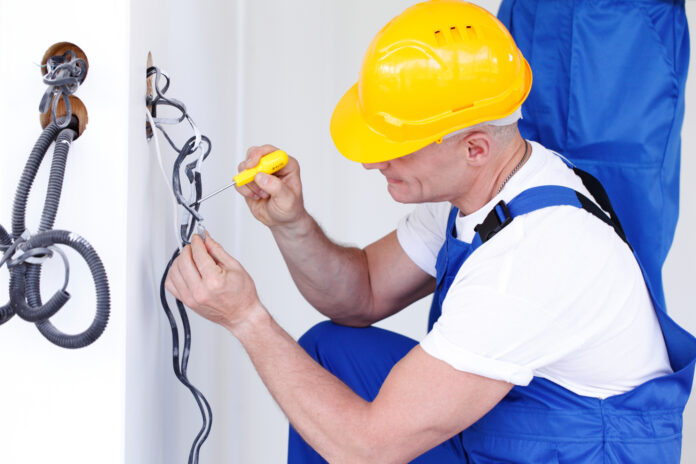Responsible homeowners like you take the care and maintenance of their properties seriously. That’s why you want to make the right decision when hiring an electrician.
After all, no matter where you live in the United States, you likely have a lot of electrician services to choose from. Consider this statistic as proof. It shows that in the last five years leading up to 2022, the market has continued to grow by 2.2%.
When you hire any kind of contractor for your home, you’re investing both money and your trust in the service that they provide. For that reason, we’ve compiled a complete guide to ensure you’re hiring the right electrician for your home maintenance needs.
Detailed below are six key questions to ask before hiring an electrician. Keep reading to make sure you’re prepared and making the right investment.
1. Is the Electrician Licensed in Your State?
Every qualified electrician is going to need an official license to work in your local area. Different states, though, might have different requirements when it comes to levels of licenses that might apply. It’s up to you, then, to ensure your hired electrition is properly licensed.
For instance, there’s a difference between a license for a journeyman and for a master electrician. Sometimes, they might even have to work together on a larger project in your home.
Both are educated enough and qualified to handle the most basic electrical projects in your home. A master electrician, though, has at least two more years of experience/education. Research your local state licensure regulations so that you know what to ask your potential electrical contractor.
2. Is the Electrician Insured?
In addition, asking your electrician about their insurance coverage is definitely a smart practice. You don’t want to end up with costs of damages or even medical bills in the event of a serious accident.
Rather, your qualified electrician should be covered by a comprehensive insurance policy. In many cases, this policy can cover up to $1 million in damages and/or medical bills as needed.
Sometimes, accidents happen while on the job. Since electrical work has the potential to be so dangerous, don’t risk a lack of insurance coverage on this account. Be willing to ask your electrition to show their full policy details.
3. Does the Electrician Have Verifiable Training and/or Experience?
Of course, you’re wise enough to know that anyone you hire in your home should have plenty of verifiable education and/or experience. There are many ways to determine how reputable a potential electrical contractor may be.
For one, you can start with a simple online search for a first impression of the contractor’s reputation. If there are online reviews or testimonials from previous customers, these could be of great value. Read them to see whether you might expect a positive or negative experience when hiring the electrician in question.
Remember, hiring an electrician is an investment that you want to ensure is worthwhile. You deserve the peace of mind that comes with knowing you can trust whoever is working in your home to not only stay professional but to also get the job done well. That’s why you should only work with reputable electricians in your area who can clearly showcase their skill sets.
4. Are Any Permits or Inspections Required for the Project?
In some cases, a large enough electrical project in the home can require a local permit. Examples include rewiring large areas of the home, installing a permanent generator, etc.
If you think that might apply to your electrical needs, it’s essential that you do some of your own research ahead of time. That way, you have a better idea of what to expect when it comes to additional costs as well as the duration of the project itself.
If there’s anything that you can find that indicates you’ll need a permit or home inspection to be done, take note. Your hired electrician should be able to work with the local regulatory organization accordingly. In fact, he or she should have enough knowledge about their craft to indicate whether the project needs a permit in the first place.
5. Is There Any Guarantee or Warranty for Their Services?
As mentioned above, accidents do happen even in the best of circumstances when working on home improvement projects. In an ideal scenario, though, your electrical contractor should be able to provide some kind of guarantee or warranty to protect your financial assets and home.
Ask your electrician who would be responsible for any damage that’s done to the home as a result of this home improvement project. Their answer will indicate to what extent you can trust their professionalism to have your overall best interests in mind as a customer. The existence of a guarantee or warranty indicates the contractor’s level of customer service, which should also affect your hiring decision.
6. What Kind of Costs Should You Expect for Your Home Project?
Of course, you’re likely going to be particularly interested in the costs of this upcoming project. When you ask your potential electrician for a cost estimate, don’t be afraid to request all of the specifics related to that cost.
For instance, they might quote you an original cost based on the assumed amount of time it would take to complete the electrical project. Well, what would happen if the time goes longer than expected? Are there any additional fees you should watch out for?
Remember, you deserve to feel completely comfortable with your hiring decision. If the cost doesn’t seem worth your investment based on the other answers to these questions, feel free to keep shopping around.
Make the Most of Hiring an Electrician
Your home maintenance is worth your consideration before you make any investment of your time or money. That’s why you’ll take the above advice about hiring an electrician to heart.
In addition, continue staying educated and informed on the latest trends in responsible homeownership. We encourage you to follow our blog to stay up-to-date on the day’s best practices for the care and maintenance of your home.










